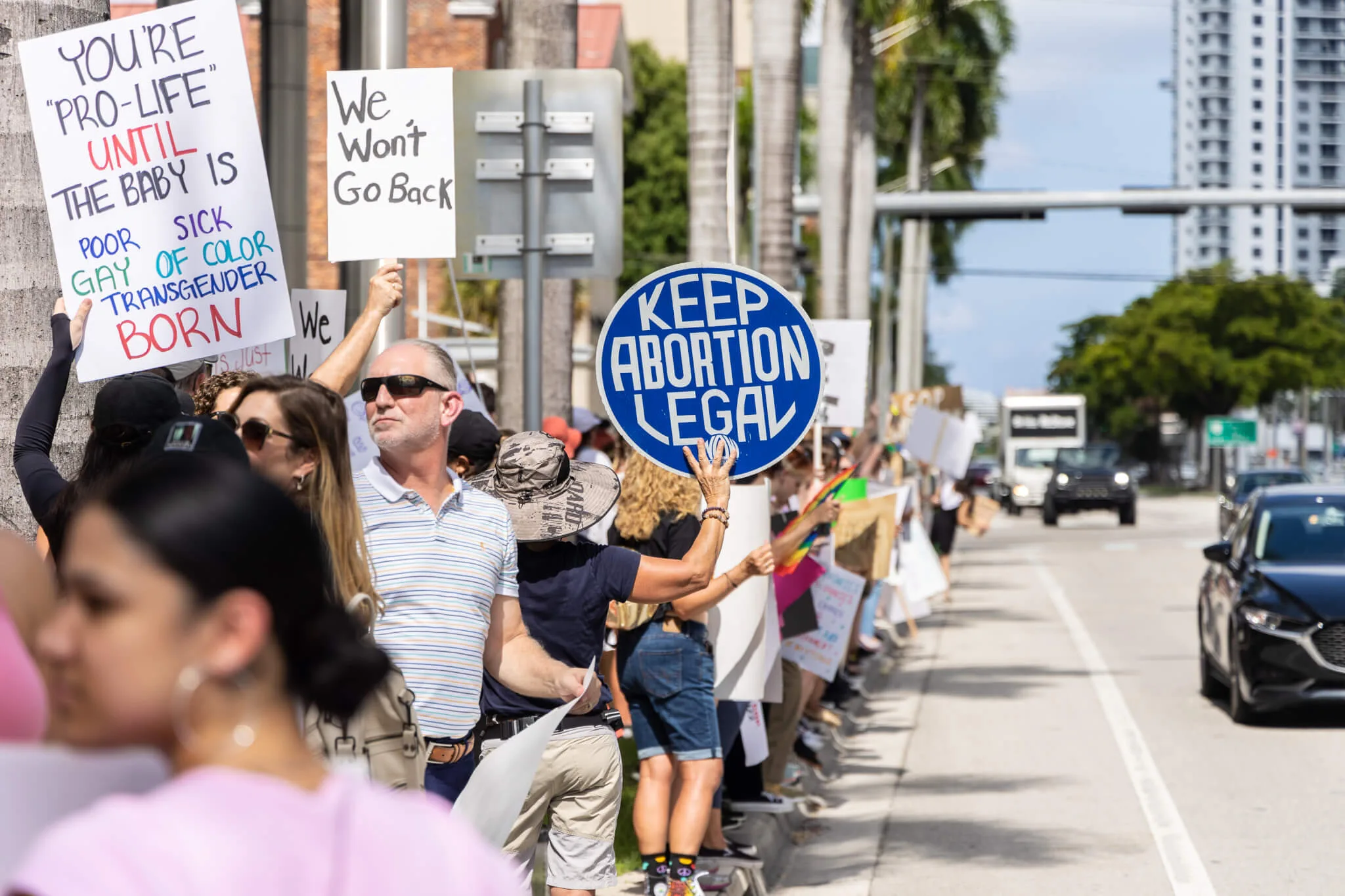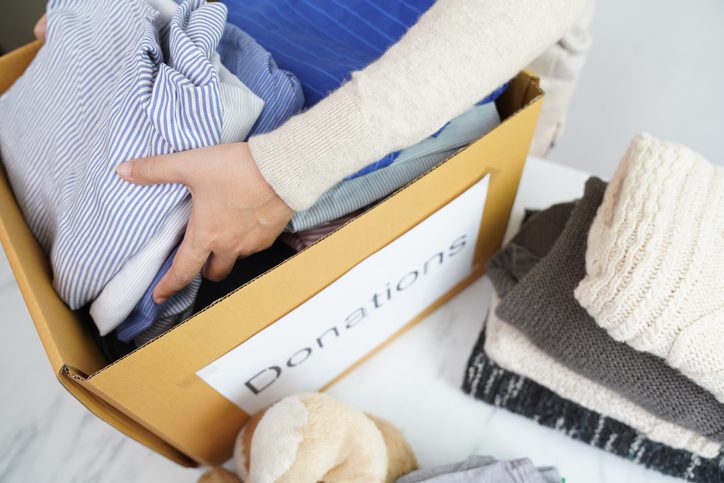
Photo by John Parra/Getty Images for MoveOn
Advocates say the consequences are many, especially for marginalized women and any woman that suffers a medical situation or miscarriage that could put their life at risk.
Until last year, women in Florida could get an abortion until they were 24 weeks pregnant. Then, in April of 2022, the Republican-dominated Florida Legislature passed a 15-week ban and the state’s courts approved a 24-hour waiting period for abortions.
One year later, almost to the day, Gov. Ron DeSantis signed into law a bill approved by the state Legislature banning abortions after six weeks of pregnancy, which makes performing an abortion in violation of the new law a third-degree felony. In the year between the two bans, the US Supreme Court overturned Roe v. Wade, stripping women of their nationwide, constitutional right to abortion and green lighting state-level bans like DeSantis’.
In September of this year, the Florida Supreme Court heard oral arguments in a lawsuit brought by Planned Parenthood and the American Civil Liberties Union challenging the 15-week abortion ban signed into law by Gov. DeSantis. If the court approves the 15-week ban, the six-week ban would take effect 30 days later.
Far reaching consequences
What would the Supreme Court’s decision mean for people in Florida and women across the South?
In a nutshell: A six-week ban would effectively ban most abortions in the state, as many women aren’t aware they’re pregnant by six weeks.
RELATED: How Florida Democrats are fighting to protect reproductive rights across the state
Until recently, Florida had been an easier place to receive abortion care than most other states in the South. If the six-week ban is enacted, women who might have sought care in Florida will have to travel many states away to get an abortion.
This is not only cost-prohibitive for many, but also requires taking time away from work and family, impacting mainly low-income women, including women of color. Florida is home to 1.4 million Latinas of reproductive age, and of this population 558,000 are economically insecure.
“Marginalized women will be most affected [if the six-week ban goes into effect], and any woman that suffers an unfortunate medical situation or miscarriage or any other number of medical conditions that could put their life at risk or the baby’s life at risk,” Alejandra Rondon, Latinx constituency manager at Florida Rising, Florida’s largest independent political progressive organization, told Floricua. Rondon is also co-lead on floridalibertad.com, the Spanish language arm of the Floridians Protecting Freedom campaign which is seeking to place abortion rights on the 2024 ballot in Florida.
Complex health situations
Although the six-week ban allows exceptions for rape, incest, medical emergencies, and fatal fetal abnormalities at different cutoff points, “there are many complex and nuanced health situations that arise that don’t fit these narrow exceptions,” Dr. Shelly Tien, a maternal fetal medicine physician who provides abortion care at Planned Parenthood clinics across Florida, told Time earlier this year.
“We see health-care providers placed in a difficult position,” she said, afraid that needed medical interventions–some urgent–won’t be upheld in a court of law.
RELATED: Supreme Court to decide whether to ban abortion pill nationwide
And while the state’s previous policy allowed abortion up to 15 weeks regardless of the cause, the exceptions to the six-week ban require a form of evidence—a restraining order, police report or medical record, for example—that the pregnancy actually occurred due to rape, incest, or human trafficking.
Funding Misinformation
Additionally, if the six-week ban is upheld by the state Supreme Court, $25 million from the state will be allocated to funding anti-abortion crisis pregnancy centers, or so-called Crisis Pregnancy Centers (CPCs), nonmedical facilities that work to deter women from accessing abortion care and contraceptives. There is even evidence that many promote misinformation, such as the lie that abortion causes cancer.
In response to the looming funding increase for CPCs, Senate Democrat Minority Leader Lauren Book has filed a bill– “Pregnancy Support & Wellness Services” (Senate Bill 256)–for the 2024 Legislative Session that would require the state Department of Health to perform yearly financial and compliance audits of CPCs under the Pregnancy Care Network’s purview and prohibit CPCs from sharing information that is not medically accurate, according to Florida Politics.
Other ways Floridians are fighting back
Advocates from Floridians Protecting Freedom and the Reproductive Freedom Collective of Broward are fighting to put abortion on the ballot in 2024. This would give voters the power to protect abortion rights until fetal viability, which is usually around 23 to 24 weeks of pregnancy.
“The goal is to have a million signatures by December of this year. Then we are able to put the question on the ballot to voters of whether they believe women should have legal access to abortion in the state of Florida, and that would amend the constitution to make that possible,” Rondon said.
As of Dec. 14, Floridians Protecting Freedom reports that it has gathered and submitted more than 1.3 million signatures so far. The website of the Florida Division of Elections says it has validated 687,699 signatures as of mid-December.
The deadline to get the petitions submitted and verified is Feb. 1.
Rondon is optimistic that if voters are able to decide on the issue, they’ll vote to protect abortion rights in Florida. “I think the overwhelming majority of Floridians believe that this is a decision between a woman and her doctor,” Rondon said.
Support Our Cause
Thank you for taking the time to read our work. Before you go, we hope you'll consider supporting our values-driven journalism, which has always strived to make clear what's really at stake for Floridians and our future.
Since day one, our goal here at Floricua has always been to empower people across the state with fact-based news and information. We believe that when people are armed with knowledge about what's happening in their local, state, and federal governments—including who is working on their behalf and who is actively trying to block efforts aimed at improving the daily lives of Florida families—they will be inspired to become civically engaged.


People are leaving states with abortion bans, according to study
A new analysis from the National Bureau of Economic Research found that since 2022, states with near-total abortion bans appear to have lost 36,000...

The fight for reproductive justice in Florida is ‘not over,’ say advocates
"We're going to ensure that our voices are heard," says Charo Valero of the National Latina Institute for Reproductive Justice, who spoke with...

5 places in Florida to donate clothes, shoes, and more
Decluttering your home can provide such a satisfying feeling of accomplishment. After sorting through all of your belongings and determining what...

8 Orlando hotels that pack as much fun as the theme parks
With waterslides, family arcades, playgrounds for the kids, and spas for mom and dad, these Orlando hotels will make your vacation unforgettable!...




